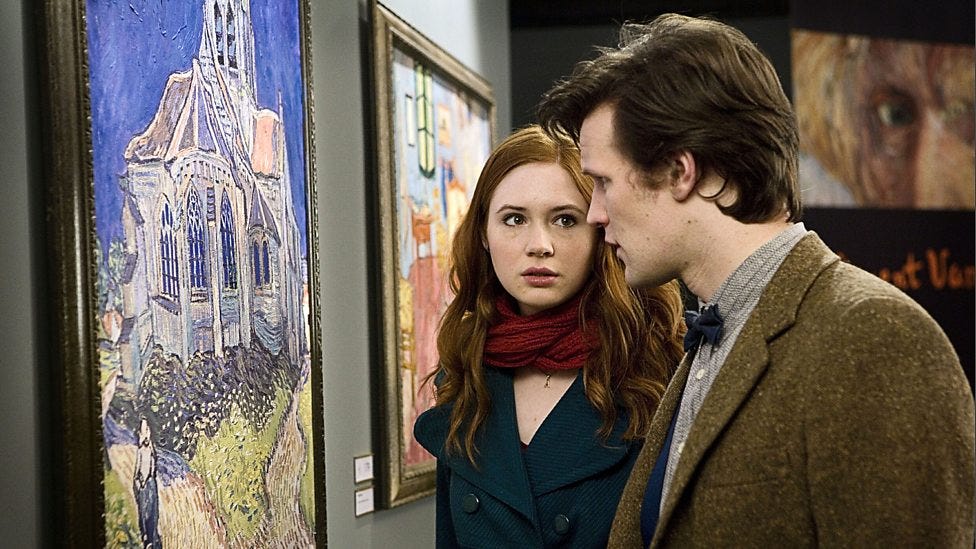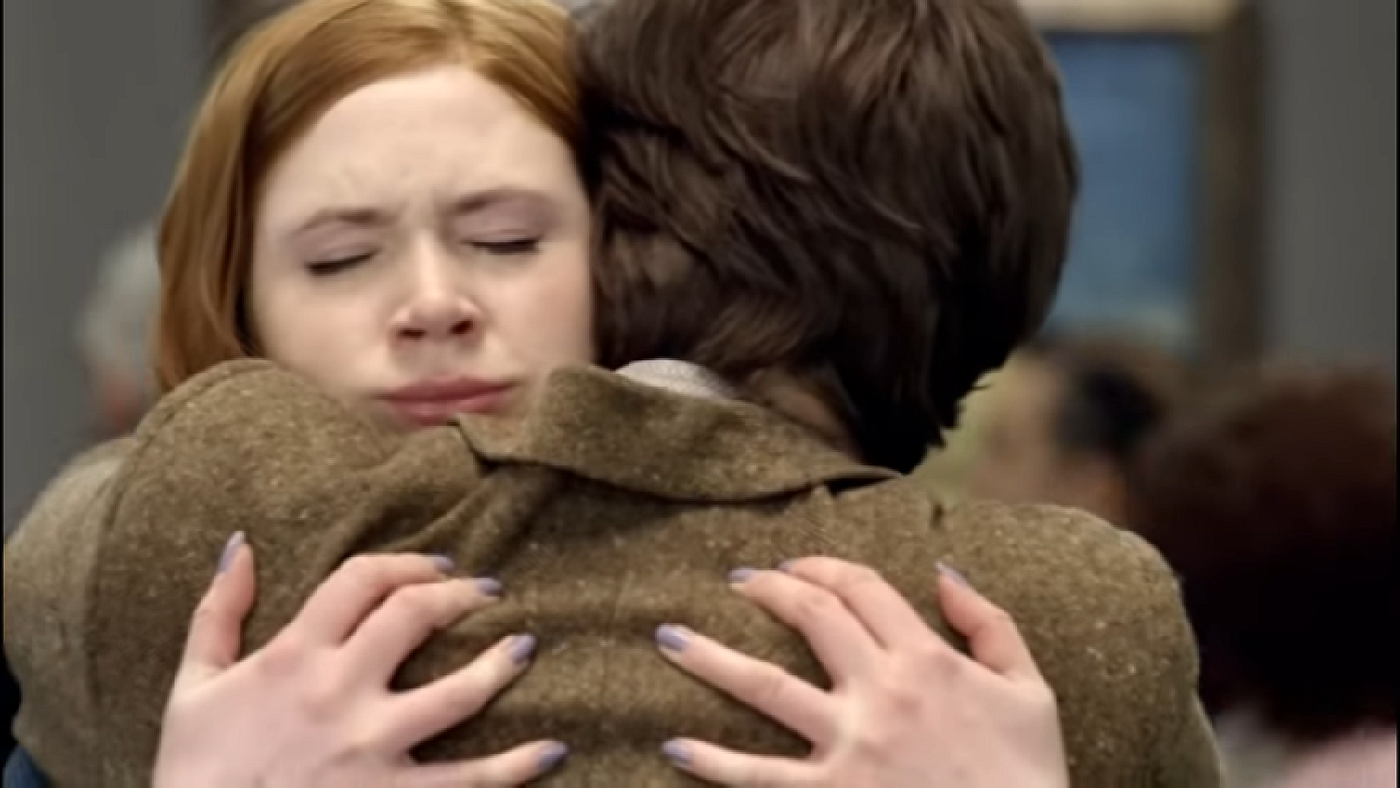Pain is Easy to Portray but to Use
The Importance of Vincent
"Pain is easy to portray, but to use your passion and pain to portray the ecstasy, joy and magnificence of our world , no one had done it before — perhaps no one will ever do it again. "
I watch Vincent and the Doctor a lot. It is an episode of Doctor Who that almost every fan you speak to will refer to as one of the most effective ways to show someone what Doctor Who is all about as a TV show in general. On the surface it has everything you'd expect to be in there — the Doctor and his companion going to a different time to fight a strange alien monster and having their final hurrah — yet the beauty of Vincent and the Doctor is that deep down there is so much more going on. It is that which makes Vincent and the Doctor an important bit of television to watch, even beyond the boundaries of Doctor Who.

Vincent and the Doctor sees The Doctor and Amy Pond visit the life of Vincent Van Gogh in his battles against an invisible monster fighting against him. Now the monster is not obvious to the human eye yet finds itself appearing in Van Gogh's paintings yet haunts Van Gogh at all times. The metaphor is obvious here — whilst we eventually see a physical monster as the antagonist of the plot the invisible monster is essentially Van Gogh fighting his depression. Much of the episode sees Tony Curran's incredible and fragile portrayal of Vincent Van Gogh as a man who is hurt by the rejection of the locals and the dismayal of his own work, all wrapped up in his fight against the depression affecting him so badly.
Yet Vincent and the Doctor manages to find a way to talk about mental health in such a way that even after many, many watches it still really gets to me and digs deep. Richard Curtis made the connections to the fragility of mental health throughout the episode with the comparison to this invisible monster but it is the finale of Vincent and the Doctor in which the real heart of this discussion about mental health lays in a scene that I dare anyone to watch and not want to tear up.
Oh, that scene. That beautiful, heartbreaking scene.
Cue 'Chances' by Athlete and The Doctor, Amy and Vincent emerging from the Tardis in modern day Paris. Vincent is led into the Musée d'Orsay and is shown his own success and how revered he finds himself against the conflicts of his failures he always felt in his mind. Bill Nighy's Dr. Black mutters the legacy of Van Gogh and describes the beauty of his work, to which Van Gogh breaks down and realises how much of an effect he had on people in an emotional moment. Vincent returns to his time spurred on by this realisation and the excitement pours out of Amy as both The Doctor and herself return back to modern day Paris to see all of his new work and all of his new life after seeing just how much people loved him.
Van Gogh still killed himself at the same period in time. Despite seeing everything he would become, his illness still killed him and the outcome the same in reality.

The power of this moment never loses its impact. To have that scene where the realisation kicks in that the invisible monster that was Van Gogh's depression still hurt him and eventually still killed him is something that echoes into reality to a lot of people. You have to remember too that Van Gogh suffered from these afflictions in real life and that this is a portrayal of a man who actually went through the pain he suffered not knowing what he would one day become. It seems a little scarier personally that it isn't merely fiction when we look back at that.
It really hits home quickly how serious and significant the power of mental health can be. To have that realisation of worthlessness when the world feels like it has changed all for the better when it cannot be compared to how someone may seem on the outside to what is going on inside. It hurts and it's not easy. Yet in this final scene Richard Curtis wraps up the discussion of mental health in such a beautifully delicate way that it becomes an important bit of television to discuss.
After Amy realises the outcome of Vincent after taking him to the gallery, The Doctor says a line that sums everything up:

Mental health illnesses are not something that you can simply be cured from or disappear over time. They have the potential to be devastating, and can often stay with a person throughout their life even though it can be medicated against and controlled. Vincent and the Doctor's ending makes that frightening clear to the audience — we see the joy in Vincent's life return at the moment but within weeks he had still killed himself. It is not something to be taken for granted.
It might all sound negative but Vincent and the Doctor does have a very positive thing to take away from all this too that should not be overlooked. When the Doctor mutters the above quote about good things and bad things, he enforces the point that everything you can do to fight your mental health makes an impact regardless of how insignificant it may seem in the bigger picture. At this point it could be easy for a character, whether it be a TV show or just someone you're talking with, to say that it was all a waste; that nothing had changed and nothing made an impact. Even little things that make that moment better and make that moment happier are still an impact. It may not have stopped everything but given the power of mental health every small moment that is of positive effect is a little victory in the ongoing battle.
I think that's why Vincent and the Doctor is such an important bit of television. In this modern day where we are recognising the effects of mental health and focusing on how we can help each other more seriously we have a television show like Doctor Who focusing an episode on it and making it a talking point in such a beautiful way. Our lives are all so complicated now that as we grow up we go into avenues we may not understand or know how to deal with in ways that people may not how to treat. At some point in our lives it's likely we're all going to have some form of difficulty with our mental health and it is important that we have moments like these to remind us that we can get through it.
Unfortunately the reality of Vincent's life away from this episode is sadder in the sense that he didn't get a chance to see his work so loved and respected centuries later but the fact that someone can create such incredible pieces of work as a form of masking his internal pain is an example of how creativity can be used. It is horrible to think that at the time of Vincent's death his illness wouldn't have been recognised but there's so much beauty in his work that it can show just how far mental health illness can reach. You can literally be anyone in the world and be susceptible.
It's of great credit to Tony Curran as well for making the character seem so fragile as he fights his demons throughout the episode. When Van Gogh arrives at his own exhibition and Bill Nighy gently utters his adoration for the man behind the paintings it's hard not to well up alongside Curran as he breaks down as Van Gogh hearing how much love someone, even if just one random stranger, can have for this strange loner from the fields of The Netherlands. Richard Curtis may have done an excellent job putting everything together and making it work as well as it does but it's twice as heartbreaking when you've got a performance as effective as this from Curran.
If you've not spent the time sitting down to watch Vincent and the Doctor I'd strongly advise you do so even if you've never watched Doctor Who. I often use Vincent and the Doctor as a starting point for people who want to get into it because it is, personally, the essential package of what makes Doctor Who so special to me. It's a story with a purpose and with characters that have reasoning, and even with the sadness of Vincent's life and that demolishing ending there's still something very magical about watching the gang run around the fields of Arles and seeing Vincent's ideas come to life.
On IMDB, this episode is currently the joint 3rd highest rated episode of the modern series. For the 47 minutes or so that it is on for, it not only creates a magical experience into the life of Vincent Van Gogh that younger fans may not know about, or perhaps even the general audience not knowing about Van Gogh's illness. It also creates a strong reminder that a light can always shine in the darkness with The Doctor and Amy being Vincent's light, and even if life may seem infinitely dark there's always someone who is going to want to be that light. The light may not solve everything being dark but it'll help illuminate your way through it.
Source: https://medium.com/@lukehmuse/the-importance-of-vincent-acc81036d3de
Post a Comment for "Pain is Easy to Portray but to Use"